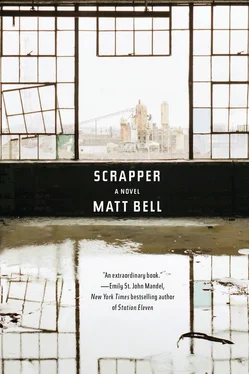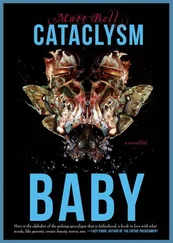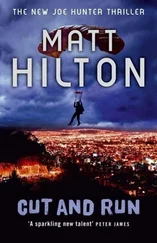Matt Bell - Scrapper
Здесь есть возможность читать онлайн «Matt Bell - Scrapper» весь текст электронной книги совершенно бесплатно (целиком полную версию без сокращений). В некоторых случаях можно слушать аудио, скачать через торрент в формате fb2 и присутствует краткое содержание. Год выпуска: 2015, Издательство: Soho Press, Жанр: Современная проза, на английском языке. Описание произведения, (предисловие) а так же отзывы посетителей доступны на портале библиотеки ЛибКат.
- Название:Scrapper
- Автор:
- Издательство:Soho Press
- Жанр:
- Год:2015
- ISBN:нет данных
- Рейтинг книги:4 / 5. Голосов: 1
-
Избранное:Добавить в избранное
- Отзывы:
-
Ваша оценка:
- 80
- 1
- 2
- 3
- 4
- 5
Scrapper: краткое содержание, описание и аннотация
Предлагаем к чтению аннотацию, описание, краткое содержание или предисловие (зависит от того, что написал сам автор книги «Scrapper»). Если вы не нашли необходимую информацию о книге — напишите в комментариях, мы постараемся отыскать её.
Scrapper
Scrapper — читать онлайн бесплатно полную книгу (весь текст) целиком
Ниже представлен текст книги, разбитый по страницам. Система сохранения места последней прочитанной страницы, позволяет с удобством читать онлайн бесплатно книгу «Scrapper», без необходимости каждый раз заново искать на чём Вы остановились. Поставьте закладку, и сможете в любой момент перейти на страницу, на которой закончили чтение.
Интервал:
Закладка:
He wrote, The two ways of seeing the room: the scrapper and the salvor.
The boy was screaming the first time Kelly touched him. He couldn’t get the boy to stop. He had tried to pick the boy up because he couldn’t see the cuffs around his ankles.
The cuffs caught and the boy screamed again.
Kelly had sawed the handcuff chain but he barely remembered doing it. By then the boy had almost stopped crying. Maybe there wasn’t any sound except for the scraping pull and push of the saw, the breaths in between.
Kelly wrote: The night of the first snow. The night I found the boy. The beginning of my involvement in the case but not the beginning of the case. When had the boy been reported missing? Two days earlier. When had the boy actually gone missing? The day before that. The entire case three days long, the crime cut short by my entrance. My last night as a scavenger. I must have known but I went back for my tools. While the boy waited in the locked truck, down in the dark of the pit.
The facts of the case, the scenes of the crime: The boy’s school, the house where the boy was kept and watched. The car that ferried the boy. The man in the red slicker. The accumulation of mattresses and foam and handcuffs. The purchase of tools. The lock on the basement door. The coming and going from the house and how had no one seen him coming and going. Easy. The complete absence of neighbors. The total lack of community. The man in the red slicker and the boy, adrift in the zone, waiting for the first to find the second.
The confidence it took to take a boy. The confidence it took to park right in front of the school. Confidence or else direst need. And if the man who kidnapped the boy wore a mask, then when the boy first saw my face he must have thought I was the kidnapper, carrying the same wants into that basement.
What if this wasn’t the first time. Then what happened to the other boys. Then what would have happened to the boy if I hadn’t found him. And if there is this depravity what other depravities exist, wherever no good man is looking.
What is the responsibility of the good man in the zone?
Is detective a role or an action. Is the good man an action too.
Can I take on the role of the detective and carry it to its completion.
Can pretending to be a good man one day make me a good man.
Outside, a great rain filled the city, overwhelmed the sewers. Another hundred thousand homes went without power and today there would be no work and in the dark of the apartment Kelly smoked and listened to the thunder announce the lightning and he wrote in the notebook and when he got bored he did one hundred push-ups, one hundred sit-ups, sets of one hundred squats, lunges, leg lifts. He thrilled at his body in motion, his body hurting. He was strong from the zone but he knew he could be stronger. In high school he’d put on muscle fast, lifted his way into the starting lineup, the top of his weight class. The pride of his father’s coaching. County wrestling champion one year, state champ the next. Once he’d been able to run for miles without tiring and he wondered if he could make himself do it again.
5
THE PHONE RANG and Kelly didn’t recognize the number. The phone rang again and he let it go to voicemail. He waited for the beep and then he pressed the button, put the phone to his ear, heard the boy’s voice. He listened to the message, listened to it again. Five minutes later, the first text arrived: this is daniel call me
Then: this is daniel i have my own phone
so i don’t get lost again
this is daniel
Kelly had given the boy his phone number and the boy had put it to use. What could Kelly write back? The one thing he knew.
this is kelly.
They were strangers but now they would be something else. Kelly couldn’t pretend he didn’t know what a bad idea was because here they were at the start of one, a mistake amassing potential.
this is daniel
whats your address
i want to see you too
Kelly unbuttoned the top button of his shirt, smeared the sweat from his neck and chest. He put his thumbs to the screen, typed his new address. The invitation had become a trap. He was the sole suspect in the kidnapping and he had shown who he was: someone who wanted the boy, who couldn’t keep from asking for more.
how will you get here.
i’ll come get you.
are you home.
are you home.
are you home.
An hour passed before the phone beeped again. Kelly went to the intercom beside the door and he buzzed the boy in, then opened the door to find the boy in his school uniform, the blue jacket and the striped tie, the khaki pants over clean white sneakers. He wanted to ask the boy why he’d come but it wasn’t the right way to start.
Kelly asked, How did you get here?
My brother brought me, the boy said. I told him this was a friend’s house.
Okay, Kelly said. Come in. This way.
Kelly pointed to a chair on the other side of the room, took his own seat on the couch. The boy sat where he was told. He had a quiet politeness in his movements Kelly had seen before, known himself, the boy moving as if afraid to make a mistake. The notebook was on the coffee table, folded open. The case, Kelly was calling it. The case notes. Kelly picked up the notebook, folded the cover around the spirals. The television was tuned to a documentary about whales, whale songs. The narrator claimed whales could recognize voices through a thousand miles of black water but military outposts and underwater fiber-optic cables disrupted the songs, confused the whales, and limited the range of their speech. The sound was below the limits of human hearing and so it took special equipment to know what had been lost. The cost of progress, above the earth and below it and upon the air and in the sea.
Kelly muted the television. The boy asked if he could have something to drink and Kelly appreciated knowing what to do next. There wasn’t anything in the refrigerator for a boy so he filled a glass of water from the tap. He had plenty of food left from the Christian women and when he asked the boy if he was hungry he thought it was better if the boy said yes.
But then the boy’s voice spoke from closer than Kelly expected.
Kelly turned around and found the boy in the kitchen with him. A mere foot of separation breathing between their bodies. Kelly set the table, retrieved the last of a deli tray from the fridge, a plastic container of potato salad. A bottle of mustard, a jar of mayonnaise. Salt and pepper. He only had enough dishes for two people but there were only the two of them eating.
Kelly asked, How old are you?
Twelve, the boy said. Until next summer.
Twelve, thirteen. What had changed for Kelly in the gap between those years. The arrival of the new body that brought him further under his father’s gaze, bought admission into the gym and the mat room and his father’s coaching.
Kelly thought he wasn’t hungry but he knew better than to have another drink on top of the two he’d had before the boy arrived. The boy grinned above his sandwich and Kelly’s appetite awoke. He piled more meat on his plate, more cheese than the bread needed. The boy finished his sandwich first, excused himself from the table. Again the politeness but when the boy returned to the living room he sat on the far end of the couch instead of the chair. The whale documentary was still playing and the boy picked up the remote, fingered the mute, returned volume to the room. The boy watched the whales and when Kelly wasn’t watching the boy they watched the whales together.
All slap and splash atop the surface, quiet consumption underneath. Nothing was bigger than the biggest of their number, and their only predators were men and giant squid and other whales. On-screen a whale carcass appeared on the seafloor, lit by an unmanned submersible. Thirty-five tons of gray whale a mile below the surface, crawling with life: the whale had fed off the ocean and the ocean would feed off the whale. The narrator intoned the stages, the eras of the mobile scavenger, the enrichment opportunist, the sulfophilic, spoke over footage of eel-shaped hagfish swimming through the whale fall, through the fallen timber of the bones: Two years of soft-tissue consumption, one hundred thirty pounds of blubber and muscle and organ consumed every day. Then years of unimaginable creatures colonizing what was left. Then bacteria breaking down lipids in the bones for fifty more years, a hundred. The bacteria not needing oxygen to live, not expelling carbon dioxide. Sulfate in, hydrogen sulfide out. Mussels and clams living on chemosymbiotic bacteria. Limpets and snails grazing bacterial mats, biofilms.
Читать дальшеИнтервал:
Закладка:
Похожие книги на «Scrapper»
Представляем Вашему вниманию похожие книги на «Scrapper» списком для выбора. Мы отобрали схожую по названию и смыслу литературу в надежде предоставить читателям больше вариантов отыскать новые, интересные, ещё непрочитанные произведения.
Обсуждение, отзывы о книге «Scrapper» и просто собственные мнения читателей. Оставьте ваши комментарии, напишите, что Вы думаете о произведении, его смысле или главных героях. Укажите что конкретно понравилось, а что нет, и почему Вы так считаете.












